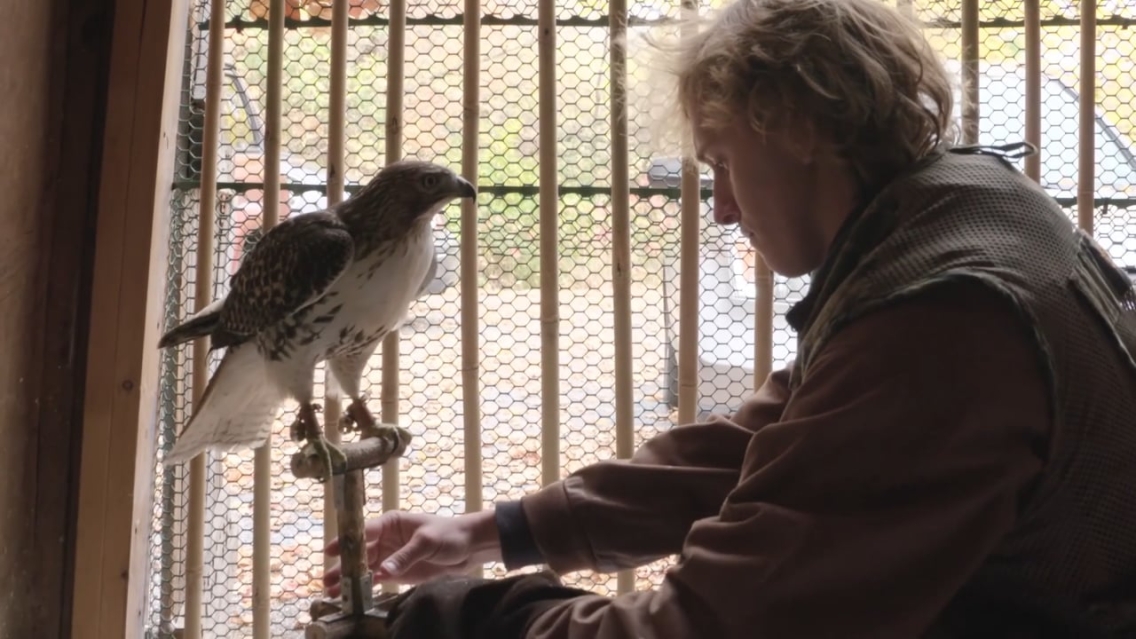Biology Major Is Also a Licensed Falconer
MIDDLEBURY, Vt. — Here comes a flock of crows intent on harassing that red-tailed hawk perched high up in an oak tree. Sensing danger for the immature raptor, Tarim Contin-Kennedy ’17.5 dashes toward the encounter, waving his arms and shooing the crows away. The Middlebury “Feb” then calls out to the hawk, extends his gauntlet-covered left arm, and the bird swoops down and lands precisely on his hand.
Contin-Kennedy is clearly not your ordinary bird enthusiast. The biology major and aspiring ornithologist is raising “Zeru” the red-tailed hawk and training him to respond to commands. One of only 12 licensed falconers in the state of Vermont, Contin-Kennedy has been training raptors since he was 11 years old.
The son of an expatriate American father and native Italian mother, Contin-Kennedy says his interest in falconry was a direct result of the “lack of recreational opportunities for me as a boy growing up in Yemen,” where his father was a consulting engineer. Young Tarim learned to “rehab animals” at a public zoo in Sana’a—an experience that “proved to be the best way to develop an intimate relationship with animals.”
Contin-Kennedy’s concern for wildlife extends beyond his interest in falconry and his college classes in animal behavior and cell biology; in 2013 he co-authored an article for Al Jazeera titled “Yemen: Arabia’s Wildlife Supermarket” that exposed how exotic animals are smuggled from Africa through Yemen to buyers in the Persian Gulf.
“Falconry started out as a little hobby for me and over time it has developed into my passion,” he explains. “I hope to turn my love for raptors into a profession, but for now I find that caring for Zeru and training him gives me emotional stability and a strong sense of accomplishment. In fact, Zeru just made his first hunt of the season and caught a mouse!” (Zeru means “sky” or “heaven” in Basque.)
Most falconers in Vermont have to complete a two-year apprenticeship before gaining a license from the state to train a raptor, but the 21-year-old Middlebury undergraduate got his license without the required apprenticeship.
“Tarim came to Vermont as an experienced falconer so he started here as a general-class falconer right after he passed the test covering falconry skills, raptor biology, and state regulations,” said Jon Kart, the wildlife strategy coordinator for Vermont Fish and Wildlife Department. In addition to the exam, Contin-Kennedy’s falconry equipment and the aviary where he houses Zeru also had to pass inspection by the state.
Kart points out that all Vermont falconers have to file regular reports with the state agency and the U.S. Fish and Wildlife Service, and that Vermont’s wildlife officials stay in “semi-regular contact” with all licensed falconers, particularly whenever a raptor is acquired, released, lost, or dies.
“Tarim does not own that bird,” the fish and wildlife official is quick to point out. “He is authorized to capture and possess a red-tailed hawk for use in falconry, but the bird is considered a wild animal and it is protected by state and federal law.”
With Zeru perched on his arm, Contin-Kennedy walks from his off-campus residence to a nearby field to train his bird. (Rewards for the hawk—chunks of raw rabbit meat with bones intact—are a key component to every training session.) This time the falconer hopes the crows swooping over Otter Creek will leave his raptor alone.
Contin-Kennedy plans to let Zeru go free in the spring. “While he is still with me, I can ensure that he is properly cared for. And when I do release him in either April or May [of 2017], there should be plenty of prey for him so he will hopefully live a long and prosperous life in the wild.”
When that time comes, the self-assured Contin-Kennedy will take it in stride. He has caught and trained (or attempted to train) 37 wild birds in his lifetime and he has no intention of stopping now.
Reporting by Robert Keren; Video by Chris Spencer; Photo by Demetrius Borge


